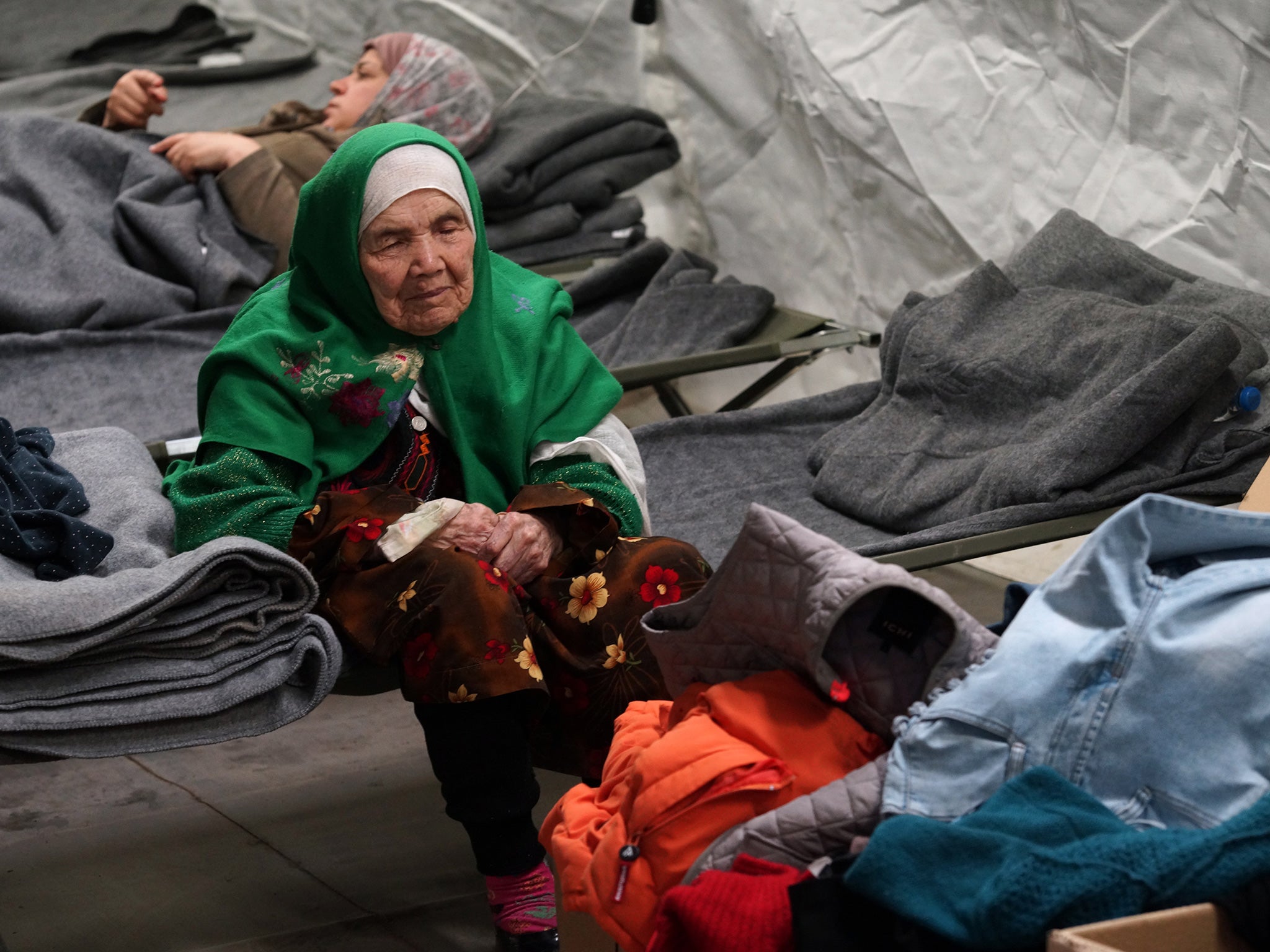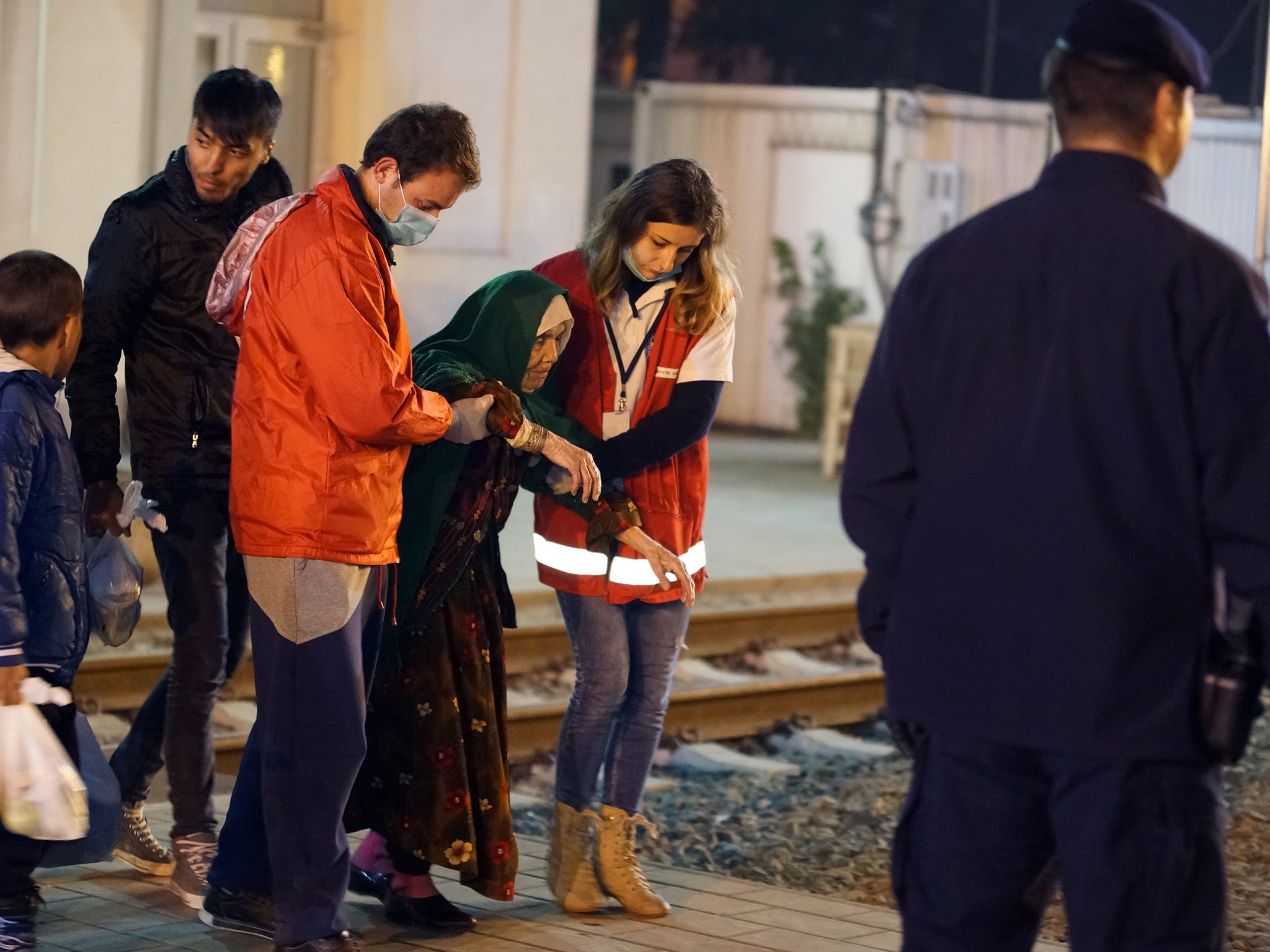Refugee crisis: The 105-year-old Afghan woman struggling to find asylum in Europe
Bibhali Uzbeki has spent a large amount of her journey from Afghanistan on the back of her 67-year-old son

Your support helps us to tell the story
From reproductive rights to climate change to Big Tech, The Independent is on the ground when the story is developing. Whether it's investigating the financials of Elon Musk's pro-Trump PAC or producing our latest documentary, 'The A Word', which shines a light on the American women fighting for reproductive rights, we know how important it is to parse out the facts from the messaging.
At such a critical moment in US history, we need reporters on the ground. Your donation allows us to keep sending journalists to speak to both sides of the story.
The Independent is trusted by Americans across the entire political spectrum. And unlike many other quality news outlets, we choose not to lock Americans out of our reporting and analysis with paywalls. We believe quality journalism should be available to everyone, paid for by those who can afford it.
Your support makes all the difference.There are few refugees as remarkable as Bibihal Uzbeki. The 105-year-old woman has made an arduous journey to Europe in search of a better life, often carried on the back of her 67-year-old son and her teenage grandson due to her fragile health.
“We had problems many times. I suffered a lot,” she told a reporter from the Associated Press in Croatia. “I fell and injured my head. I have scars on my head.”
However, Uzbeki's path to a new life in Europe is going to face a serious complication: She's from Afghanistan.
Uzbeki and her family are just a small part of an enormous movement of people from Afghanistan who have fled to Europe this year, most of whom have traveled via Turkey and onwards on what has been called the "Black Route." Afghans make up about 20 percent of the 560,000-plus arrivals by sea that Greece has seen in 2015, second only to Syrians fleeing their country's civil war. There are more than three times as many Afghans asylum-seekers as from the next-largest group, Iraqis.

While the majority of Syrians and Iraqis are accepted as refugees in Europe, would-be refugees from Afghanistan face a more unpredictable response from European authorities. In a recently released report, the European Asylum Support Office, a European Union agency designed to help coordinate asylum practices, had found that Afghan asylum seekers faced a wide variation in rates of acceptance across member states.
Even Germany, with its reputation for openness to refugees, has a complicated stance on Afghans. On Wednesday, Germany announced that Afghans who apply for asylum in the country would most likely be sent back home. The number of Afghans coming to Europe had created an "unacceptable" situation, Interior Minister Thomas de Maiziere told reporters, adding that many were members of the middle class who "should remain and help build the country up."
While Germany had allowed failed Afghan asylum seekers to remain in the country in the past, officials now favor deportation. According to a report published Sunday in the Frankfurter Allgemeine Zeitung, Germany has called on the European Commission to help negotiate a readmission agreement with Afghanistan that would allow more of the asylum seekers to be sent back to their homeland. The newspaper wrote that the Interior Ministry no longer felt that the situation in Afghanistan was similar to that of Syria, and that Afghans could be deported back to Kabul or other safe areas of the country.
"Many European governments increasingly argue that if a person is only likely to face serious harm in one part of the country, then they should move to a safe part of that country rather than seek asylum," Alexander Betts, director of the Refugee Studies Center at Oxford University, says. "It is a very worrying practice with implications for many Afghans."
Afghanistan's refugee crisis has been around a long time. You can trace its roots to the 1980s, when about 5 million Afghans fled a war that broke out with the Soviet invasion. Most headed to neighboring Pakistan and Iran. It was only after 2002 that these refugees began to head home, but many found that return difficult. Some ended up internally displaced, others elected to leave the country again.
Liza Schuster, a sociologist from City University in London who studies Afghan asylum seekers, says that over the past year, there has been a growing sense in Afghanistan that things are never going to get better. She points to disappointment in the economy since the election of President Ashraf Ghani last September and a growing feeling of danger due to a continued Taliban insurgency and a new Islamic State one.
"The feeling is that after 15 years, very little progress has been made," Schuster says. "It doesn't matter that in reality some progress has been made. The feeling is that we're slipping backward fast. Hope is shriveling up."
Afghan refugees in Pakistan are also part of the new surge of Afghans trying to reach Europe. Many are concerned that Pakistan's limited tolerance of their communities is coming to an end, and they are willing to risk a journey to Europe rather than a return to a chaotic and troubled Afghanistan. Some are of the Hazara Shia minority who have legitimate concerns about violence from the Taliban.
Despite the very real problems Afghans faces at home, over the past year, their plight has been overshadowed by the situations in a number of other countries.
In a meeting with Washington Post editors this week, Antonio Guterres, the United Nations high commissioner for Refugees, said that while Syrians, Iraqis and Eritreans would be included in a new program being established by the European Union to process asylum-seekers landing in Greece, Afghans would face a “more complex situation" and would not be automatically assumed to have legitimate asylum claims.
According to Betts, part of the problem is that Afghans represent an uncomfortable grey area for Europe. While many do not meet the full definition of a refugee, they are not really economic migrants either. "We collectively lack an institutional framework to respond to the needs of people who flee fragile states such as Afghanistan, Libya and Yemen but who are not refugees," Betts says.
While some Afghan leaders have pleaded for refugees to stay in the country, warning of a potential "brain drain," others have expressed sympathy for their plight and asked Western states to be more accepting. In an interview with Deutsche Welle, Afghan Minister of Refugees and Repatriations Sayed Hussian Alimi Balkhi said that the security situation in Afghanistan was getting worse and that he had been urging E.U. states to take in more Afghan refugees and stop deporting failed asylum seekers.
The complicated situation may create big problems for would-be Afghan refugees in the future. The Uzbeki family are hoping to make it to Sweden, a country that has deported Afghans – against the Afghan government's wishes – very recently. Each asylum case is judged on its own merits, however, and Bibihal Uzbeki's age may well help her case. "Anything is possible," Schuster says.
Washington Post
Join our commenting forum
Join thought-provoking conversations, follow other Independent readers and see their replies
Comments